Seminar Theme: The Agrarian Question Today
Postdoctoral Fellow
Mythri Prasad-Aleyamma
Email: mprasad1@gc.cuny.edu
“Migration and Production of Space: Labour, Capital and the State in Kerala, India”
Bio: Mythri is a critical geographer whose research interests primarily revolve around migration and urban transformation in contemporary India. She received her PhD from the Centre for Development Studies in Thiruvananthapuram, Kerala. Building on political economy, radical geography and ethnographic methods, her doctoral research traces the different types of recruitment of migrants and local Malayali workers that reflect political contests and settlements between trade unions, corporate construction companies and recruitment agencies. She is currently working on her book manuscript based on her dissertation. Among her recent publications are two articles: “Cards and Carriers: Politics of identification in Kerala, South India” in Contemporary South Asia and “The Cultural Politics of Wages: Ethnography of construction work in Kochi, India” in Contributions to Indian Sociology.
Faculty Fellows
Ismael García Colón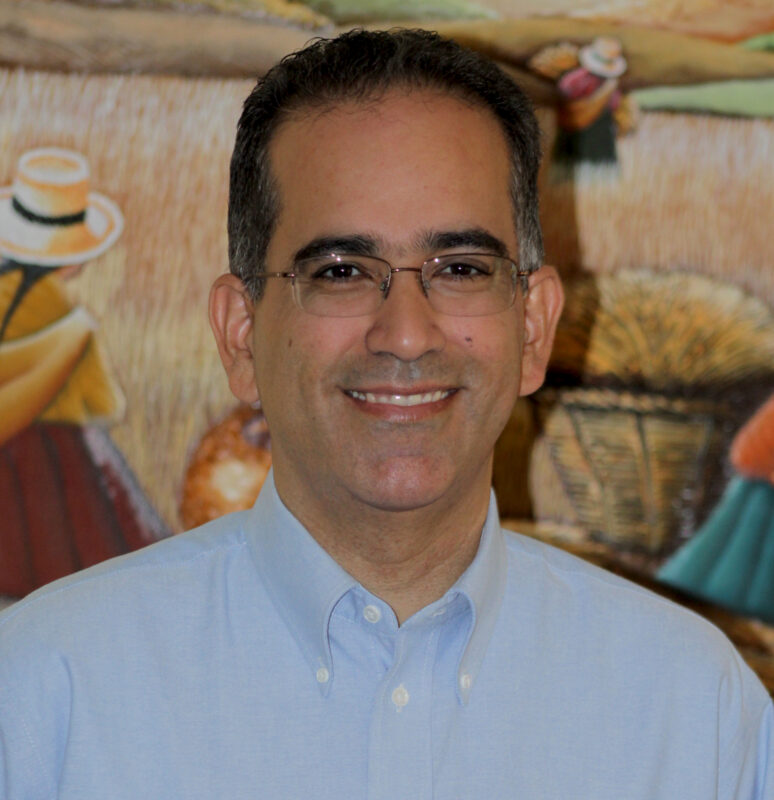
Email: Ismael.Garcia@csi.cuny.edu
Bio: Ismael García Colón is Professor of Anthropology at the College of Staten Island and CUNY Graduate Center. He is a historical and political anthropologist with interests in political economy, oral history, migration, Gramsci’s concept of hegemony, farm labor, race and citizenship, U.S. empire, and U.S ethnic and racial histories. His research experiences include documenting Latinxs in the NYC labor movement, and conducting ethnographic research on landless workers, migrant farmworkers, colonial state formation, and land distribution programs in Puerto Rico. García Colón is the author of Colonial Migrants at the Heart of Empire: Puerto Rican Workers on US Farms (University of California Press, 2020) and Land Reform in Puerto Rico: Modernizing the Colonial State (University Press of Florida, 2009). His publications have also appeared in Latin American Perspectives, CENTRO Journal, American Ethnologist, Latino Studies, and Dialectical Anthropology. García Colón’s current research explores the Puerto Rican experience in U.S. farm labor and its relation to U.S. colonialism and immigration policies, and how government policies and workers formed and transformed modern subjectivities in Puerto Rico.
Diana Mincyte 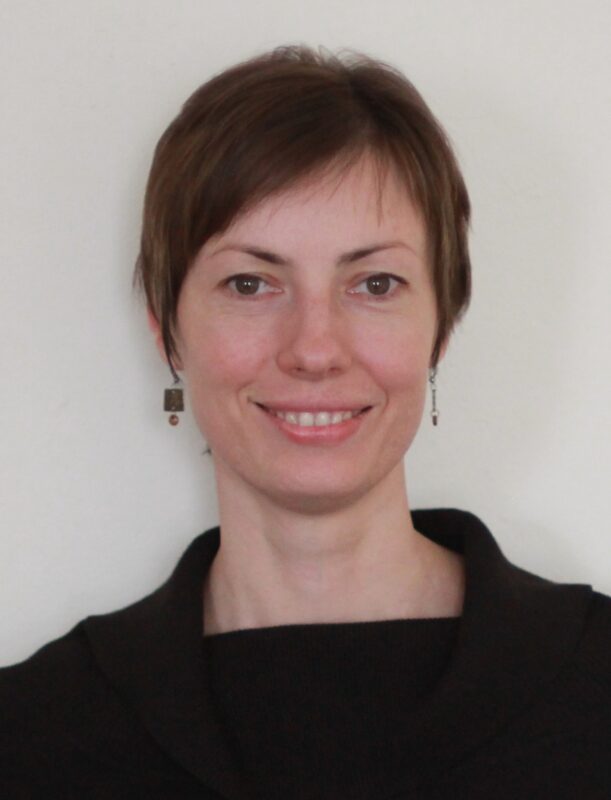
Email: DMincyte@citytech.cuny.edu
Bio: Diana Mincyte is an Associate Professor of Sociology at the City University of New York-City Tech. Her research focuses on citizenship, subsistence, and self-reliance; food and environmental politics; gender; and socialism/postsocialism in Eastern Europe. Prior to joining CUNY, she held fellowships in the Rachel Carson Center at the Ludwig Maximilians University in Munich, Germany; the Agrarian Studies Program at Yale University; and European and Mediterranean Studies at New York University; and was a visiting fellow in European Studies at Harvard University. Her research has been supported by fellowships from the Fulbright Foundation, the Open Society Foundation, and the National Endowment for the Humanities, among other agencies and published as books, journal articles, and book chapters.
Marc Edelman
Email: medelman@hunter.cuny.edu
How the Rights of Peasants Reached the United Nations
Rupal Oza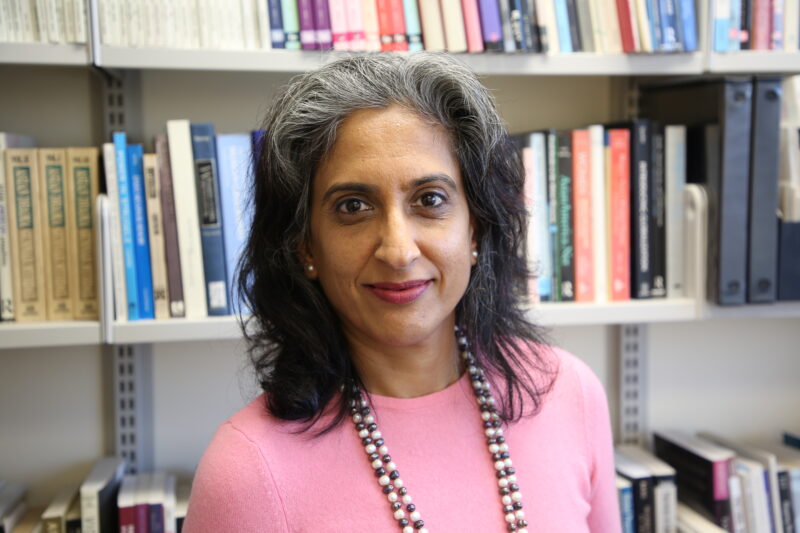
Email: rupal.oza@hunter.cuny.edu
Bio: Rupal Oza is associate professor in the Department of Women and Gender Studies, Hunter College, the Earth and Environmental Studies Program and the Women and Gender Studies Program at the CUNY Graduate Center. Her work focuses on socio-political transformations in the global south, the geography of the right-wing politics, and the conjuncture between gender, violence and political economy. Her first book, The Making of Neoliberal India: Nationalism, Gender, and the Paradoxes of Globalization was published in 2006 by Routledge, New York and by Women Unlimited, India. She has several articles in peer reviewed journals on a range of issues: human rights in an age of terror and empire, rethinking area studies, special economic zones in India, and realigned geographies after 9/11. Her most recent articles appear in Signs: Journal of Women in Culture and Society and Gender, Place and Culture and are based on three years of empirical reserch in rural Haryana. Her book length monograph entitled Semiotics of Rape: Sexual Violation & Subjectivity in rural India, based on this reaserch, is forthingcoming from Duke University Press.
Dominic Wetzel
Email: Dominic.Wetzel@kbcc.cuny.edu
Jack Hammond 
Email: jhammond@hunter.cuny.edu
Ecosocialist Agriculture
Bio: John L. Hammond, known as Jack, is professor of sociology at Hunter College and the Graduate Center, CUNY. Most of his research has been on social movements and Latin America, separately and in combination. He is the author of Building Popular Power: Workers’ and Neighborhood Movements in the Portuguese Revolution and Fighting to Learn: Popular Education and Guerrilla War in El Salvador. He has also written about the Brazilian Landless Farmworkers Movement (MST), the Bolivian indigenous movement, the World Social Forum, Occupy Wall Street, and general human rights issues. He is making a late-career transition to a specialization in environmental sociology and is working on two projects. The first is an analysis of the meaning of ecosocialist agriculture; the second is an empirical study of the effects of race, ethnicity, and income on exposure to and responsibility for pollution. He is a participating editor of Latin American Perspectives and recently retired after nearly thirty years on the editorial board of NACLA Report on the Americas. He is a past chair of the Task Force on Human Rights and Academic Freedom of the Latin American Studies Association.
China Sajadian 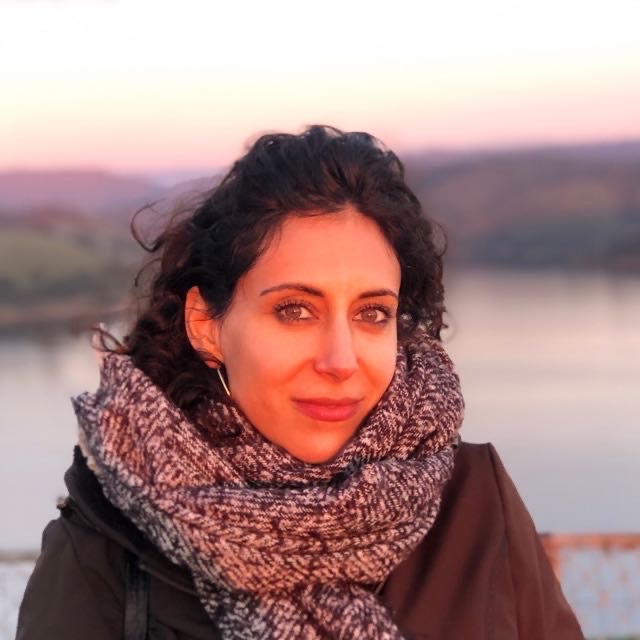
Anthropology
Email: csajadian@gradcenter.cuny.edu
Debts of Displacement: Refugee Farmworkers at the Lebanese-Syrian Border
Bio: China Sajadian is a doctoral candidate in Anthropology at the CUNY Graduate Center. Her dissertation is an ethnography of agricultural labor, circuits of debt, and gendered relations of hierarchy and interdependency among Syrian refugee-farmworkers in the Bekaa Valley of Lebanon. She situates her contemporary analysis within histories of migration from Northeastern Syria and the historical political economy of agrarian transformation in the region. She holds a BA in Government from Smith College and an MA in Anthropology from Columbia University. Her research has been awarded grants by the National Science Foundation, the Wenner-Gren Foundation, the Orient-Institut Beirut, the Committee on Globalization and Social Change, and the Center for Place, Culture, and Politics. She has taught courses on the anthropology of religion, Middle East studies, and introductory anthropology at Brooklyn College.
Martin Cobian 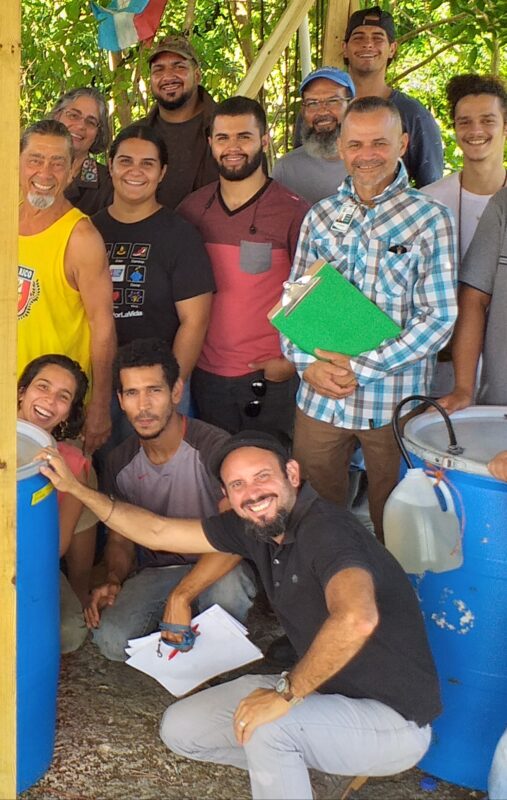
Anthropology
Email: mcobian@gradcenter.cuny.edu
Michele Chinitz 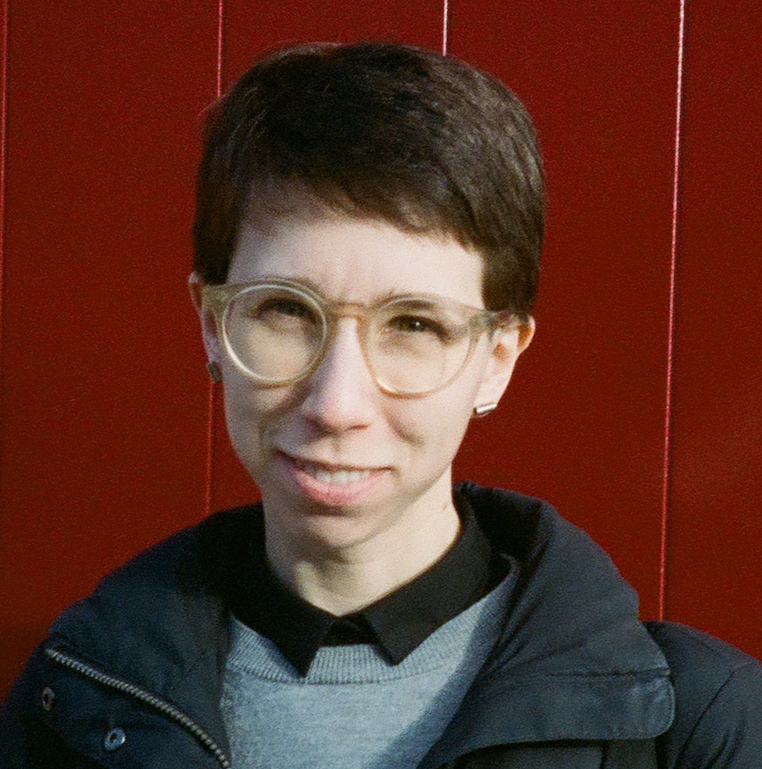
English
Email: mchinitz@gradcenter.cuny.edu
Bio: Michele Chinitz is a doctoral candidate in English at the Graduate Center, CUNY. She specializes in 20th- and 21st-century Anglophone literatures, particularly in the areas of postcolonial studies, the novel, media studies, critical theory, translation, and gender and sexuality. Her dissertation examines music and critiques of nationalism in modern fiction. It presents novels that position literature in debates about ethics and aesthetics through reference to music and that reshape the imagination of fascist and imperial histories in comparative ways. She has held courses on contemporary Anglophone writers, world literature, the history of the English novel, and composition at CUNY. She teaches for the Macaulay Honors College and the English Department of the City College of New York. She is a Fellow, in 2020-21, of the CUNY Baccalaureate for Unique and Interdisciplinary Studies, which enables nontraditional students to design their degrees and work closely with professors.
Jessie Fredlund 
Anthropology
Email: jfredlund@gradcenter.cuny.edu
Climate Change and the Ancestors: Rain, Gender and Politics in an African Water Catchment
Bio: Jessie Fredlund is a doctoral candidate in cultural anthropology studying the political history of rain in key water catchment in East Africa. Lying at the intersection of environmental history, agrarian studies, the anthropology of religion, and gender studies, her work rethinks urgent issues around climate justice while placing contemporary struggles over water in historical perspective. Her research has awarded grants from the Wenner-Gren Foundation, Fulbright, the Global Religion Research Initiative, and the Committee on Globalization and Social Change. She has also taught courses on religion, culture, and social justice at John Jay College of Criminal Justice and New York University School for Professional Studies and serves on the editorial collective for Barricade: A Journal of Antifascism and Translation. She is currently a Graduate Fellow at the Futures Initiative at CUNY and a Woodrow Wilson Fellow in Women’s Studies.
Carlos Camacho 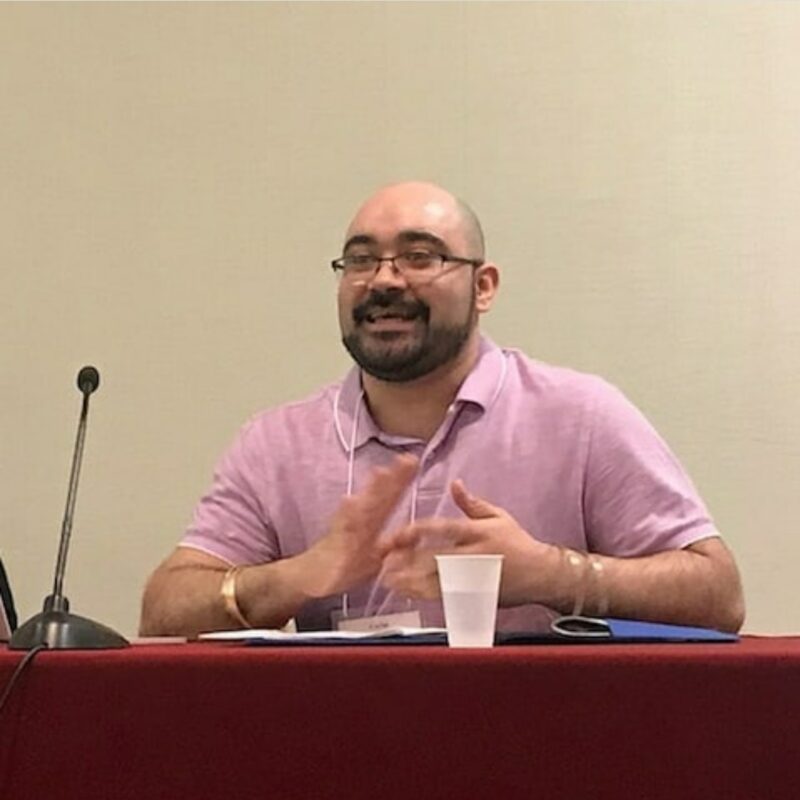
Sociology
Email: ccamacho@gradcenter.cuny.edu
Bio: Carlos M. Camacho (He/Him) is a doctoral candidate in Sociology at the CUNY Graduate Center. His dissertation looks at how LGBT individuals navigate Lucumí (commonly known as Santería), an African diasporic religious tradition. Based on in-depth interviews and ethnographic observations with LGBT practitioners in a large metropolitan city, his research highlights the experiences of trans and non-binary people as they navigate Lucumí, questioning how much of an accepting space it is, given that it is oft framed as a pro-queer religious tradition (perhaps inaccurately), and how people navigate the complexities and nuances of the tradition. In addition to the CPCP Dissertation Fellowship, he has been awarded funding with the African Studies Certificate Program Grant, and the Dean K. Harrison Fellowship.
Sally Sharif
Political Science

Kareem Rabie
Email: rabie@american.edu
Bio: Kareem Rabie is Assistant Professor of Anthropology at American University in Washington, DC. He studies privatization, urban development, and the state-building project in the West Bank. His first book, Palestine is Throwing a Party and the Whole World is Invited [dukeupress.edu], is due out April 2021 with Duke University Press. Previously he was Harper-Schmidt Fellow at the University of Chicago and Marie Curie Fellow/Senior Researcher at the Centre on Migration, Policy, and Society (COMPAS) at the University of Oxford.
Maria Luisa Mendonça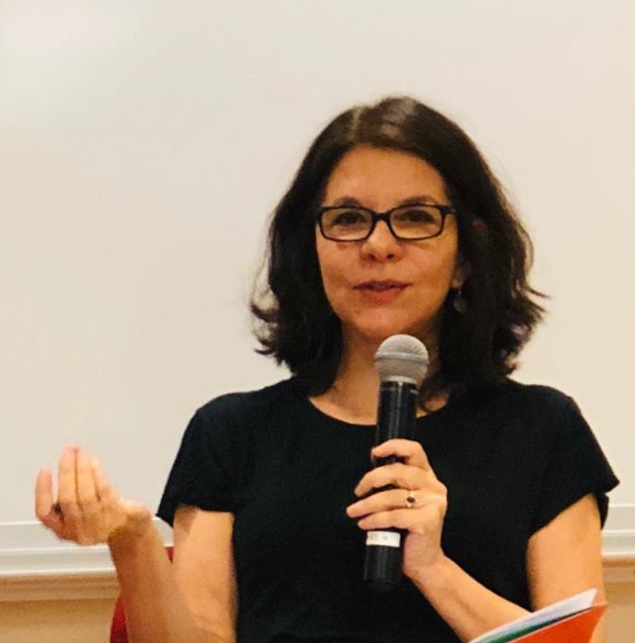
Rutgers
Email: marialuisam222@gmail.com
International financial capital and speculation with farmland in Brazil
Bio: Maria Luisa Mendonça holds a PhD in Human Geography from the Department of Philosophy, Literature and Social Sciences at University of São Paulo/Brazil (USP), and is currently a research scholar at the Center for Place, Culture and Politics at the Graduate Center of the City University of New York (CUNY). Her research includes history and political economy of agriculture, food, land and water systems, and geopolitical processes of resistance by rural social movements in Brazil and internationally. Her book Political Economy of Agribusiness (Annablume, Sāo Paulo, 2018) demonstrates the central role of the food system in international relations as a result of a dialectical movement of economic crisis and expansion in connection with critical areas such as trade agreements, financial markets, environmental justice, and transnational activism. Her current research project anticipated a trend in financial capital to “migrate” to farmland markets in the Global South, especially after the subprime crisis in the United States’ real estate market in 2008. This research on financial markets and land speculation includes building an international network of scholars and social movements throughout Latin America, North America and Europe. She has published her work in refereed journal articles, in public educational reports and in journalistic outlets. Her experience includes documentary filmmaking, investigative journalism, and community based research. She has taught international political economy at University of Rio de Janeiro (UERJ) and at the center for advanced research Fundação Getúlio Vargas (FGV), and was a visiting scholar at Cornell University in 2013. Mendonça is a co-founder of the World Social Forum and has served in expert meetings on the Right to Food for UN-Women, the Food and Agriculture Organization (FAO), and the United Nations Human Rights Commission. She is the founder of Rede Social de Justiça e Direitos Humanos (Network for Social Justice and Human Rights – www.social.org.br) in Brazil and the editor of the book “Human Rights in Brazil,” published annually since 2000.
Steve Lyons 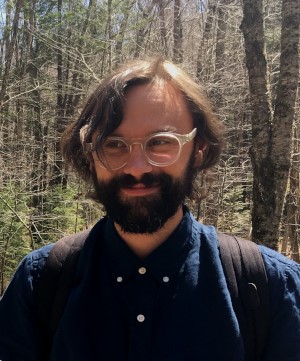
The Natural History Museum and Social Sciences and Humanities Research Council of Canada Postdoctoral Fellow
Email: steve@thenaturalhistorymuseum.org
The Supreme Court of Red Natural History
Bio: Steve Lyons is a Social Sciences and Humanities Research Council of Canada Postdoctoral Fellow at the Center for Place, Culture, and Politics. He is also a core member of art/activist collective Not An Alternative, where he contributes to the ongoing project The Natural History Museum (2014-), a mobile and pop-up museum that highlights the socio-political forces that shape nature. The Natural History Museum collaborates with Indigenous communities, environmental justice organizations, scientists, and museum workers to create new narratives about our history and future, with the goal of educating the public, influencing public opinion, and inspiring collective action. Recent essays about socially engaged art, left counter-power, and environmental justice have appeared in e-flux journal, Journal of Curatorial Studies, Museum Activism (Routledge, 2019), and The Routledge Companion to Contemporary Art, Visual Culture, and Climate Change (Routledge, 2021). He holds a PhD in Art History from Concordia University (2018) and was a FRQSC Postdoctoral Fellow at the Humanities Center of the University of Pittsburgh from 2018 to 2020.
Jordan T. Camp
CUNY Graduate Center
Email: jcamp@gc.cuny.edu
The Long Vendetta: Counterinsurgency and the Survival of Capitalism
Bio: Jordan T. Camp is Co-Director of the Racial Capitalism Working Group, Center for the Study of Social Difference, Columbia University. He is the author of Incarcerating the Crisis: Freedom Struggles and the Rise of the Neoliberal State (University of California Press, 2016); co-editor (with Christina Heatherton) of Policing the Planet: Why the Policing Crisis Led to Black Lives Matter (Verso, 2016); co-editor (with Laura Pulido) of the late Clyde Woods’ book, Development Drowned and Reborn: The Blues and Bourbon Restorations in Post-Katrina New Orleans (Univ. of Georgia Press, 2017); and co-editor (with Christina Heatherton) of Freedom Now! Struggles for the Human Right to Housing in LA and Beyond (Freedom Now Books, 2012). His work appears in venues such as American Quarterly; Antipode, Environment and Planning D: Society and Space; Eurozine; Kalfou; Race & Class; Social Justice; In the Wake of Hurricane Katrina, ed. Clyde Woods (Johns Hopkins Univ. Press, 2010); Race, Empire, and the Crisis of the Subprime, eds. Paula Chakravartty and Denise da Silva (Johns Hopkins Univ. Press, 2013); and Futures of Black Radicalism, edited by Gaye Theresa Johnson and Alex Lubin (Verso, in 2017). He is currently co-editing David Harvey’s, The Anti-Capitalist Chronicles (with Chris Caruso), completing the monograph, The Long Vendetta: Counterinsurgency and the Survival of Capitalism, among other new projects.
Tom Angotti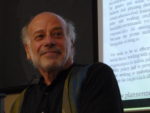
Urban Policy and Planning Hunter College and the Graduate Center, CUNY
Email: tangotti@hunter.cuny.edu
Climate Justice, Capitalism, People and Cities, and a memoir.
Bio: Tom Angotti is Professor Emeritus of Urban Policy and Planning at Hunter College and the Graduate Center, City University of New York. He was the founder and director of the Hunter College Center for Community Planning and Development. His recent books include Zoned Out! Race, Displacement and City Planning in New York City, Urban Latin America: Inequalities and Neoliberal Reforms, The New Century of the Metropolis, New York For Sale: Community Planning Confronts Global Real Estate, which won the Davidoff Book Award, and Accidental Warriors and Battlefield Myths. He is an editor of progressivecity.net and Participating Editor for Latin American Perspectives and Local Environment. In 2019, he published Transformative Planning: Radical Alternatives to Neoliberal Urbanism. He is active in community and environmental issues in New York City.



